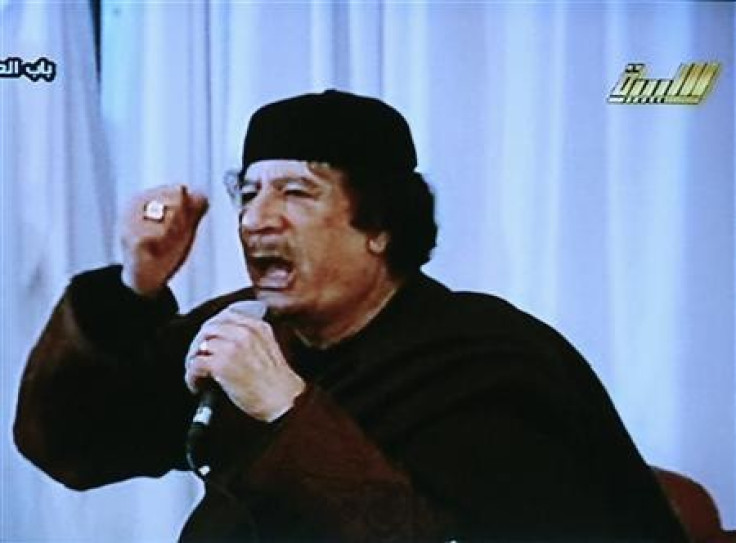Libya: Gaddafi a dead man walking?

The International Criminal Court in The Hague has issued arrest warrants for Colonel Gaddafi, his son Saif al-Islam, and his intelligence chief Abdullah Senussi for crimes against humanity. The court says there is evidences he ordered attacks on civilians during the recent uprising, in which more than 20,000 Libyans are thought to have died so far.
Although the ICC's decision is unlikely to change anything on the ground - the only other warrant against a sitting head of state was against Sudanese President, Omar al-Bashir, who has yet to be arrested - it will draw further attention to the aim of Nato's operation in Libya.
In the recent week, the African Union, the Arab league and even Italy have called for the Alliance bombing campaign to stop as civilians have been killed. Nato has however continued to increase its airstrikes and repeatedly bombed the Libyan leader compounds.
Despite Nato's denial, it is becoming increasingly clear that the organisation wants Gaddafi sooner rather than later and dead or alive.
Recently, a United States congressman says the top U.S. military commander in the international military campaign against Libya has admitted that Nato is trying to kill Colonel Muammar al-Gaddafi.
The Cable, a reporting service of the Washington-based Foreign Policy magazine, reported that Mike Turner, a member of the Armed Services Committee of the U.S. House of Representatives, said the admission was made by Admiral Samuel Locklear, commander of the Nato Joint Operations Command in Italy.
Turner told the news service that the United Nations Security Council had authorized the imposition of a blockade of the Tripoli regime, a no-fly zone over Libya and the protection of civilians.
"And Admiral Locklear explained that the scope of civil protection was being interpreted to permit the removal of the chain of command of Gaddafi's military, which includes Gaddafi."
I believed that we were [targeting Gaddafi] but that confirmed it... I believe the scope that Nato is pursuing is beyond what is contemplated in civil protection, so they're exceeding the mission."Turner said.
On Monday, South Africa President Jacob Zuma directly warned Nato against using its military campaign in Libya for the "political assassination" of Muammar Gaddafi, at the start of talks on the war.
"The continuing bombing by Nato and its allies is a concern that has been raised by our committee and by the AU Assembly, because the intention of Resolution 1973 was to protect the Libyan people and facilitate the humanitarian effort," Zuma said, referring to an African Union peace mission on Libya.
"The intention was not to authorise a campaign for regime change or political assassination," he said in opening talks in Pretoria of the AU panel on Libya.
"On the ground, there is a military stalemate which cannot and must not be allowed to drag on and
Zuma urged both Gaddafi and the rebel's Transitional National Council to make compromises to reach a deal.
"The solution in Libya has to be political and lies in the hands of the Libyan people. Our Libyan brothers and sisters - those in authority and those in the TNC - have to act boldly and show leadership," he said.
This morning, defence secretary Liam Fox tried to defend the UK and Nato's position by maintaining that the government's aim was not regime change or to kill Gaddafi, but to "protect the population of Libya".
The military campaign which began with a no-fly zone exactly 100 days ago has been increasingly criticised as the West's involvement has shifted from defending the eastern rebel stronghold of Benghazi to attacking Gaddafi's positions and shelling the capital of Tripoli.
Fox said that the West will remain involved "as long as Colonel Gaddafi is waging war on his own people".
The coalition forces and Nato's excuses are however becoming too repetitive. While their aim is to protect the civilians, the strikes have caused deaths and the operation did not prevent the rebels from abusing sub-Saharan migrants. As Tripoli is repeatedly bombed, civilians risk being caught up in the middle of the conflict, while on the ground, in the four months of conflict not much has changed. Perhaps the Alliance biggest mistake is to continue ignoring other leaders' call for a political solution as it shows the Nato is determined to deal with the conflict in its own way, leaving us with two options: either Gaddafi leaves, which sounds improbable, or he dies.
© Copyright IBTimes 2024. All rights reserved.





